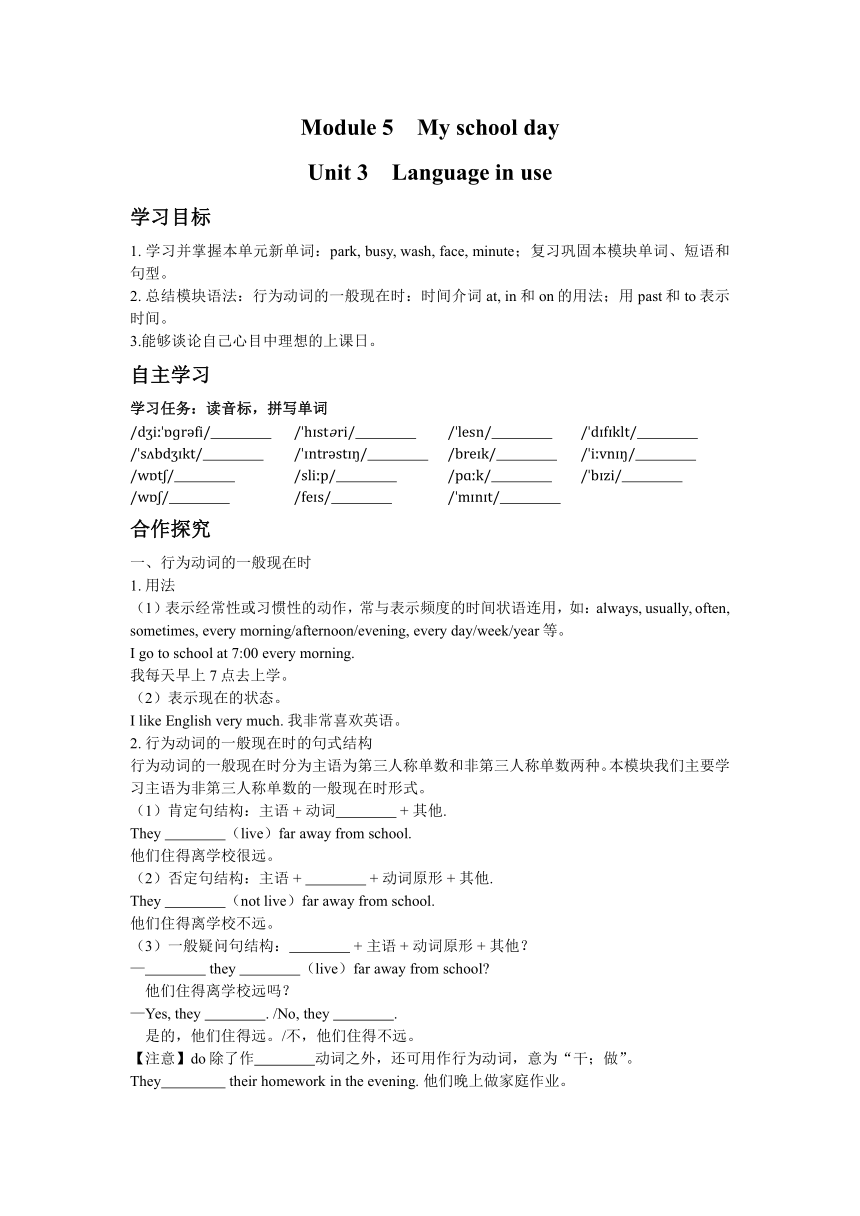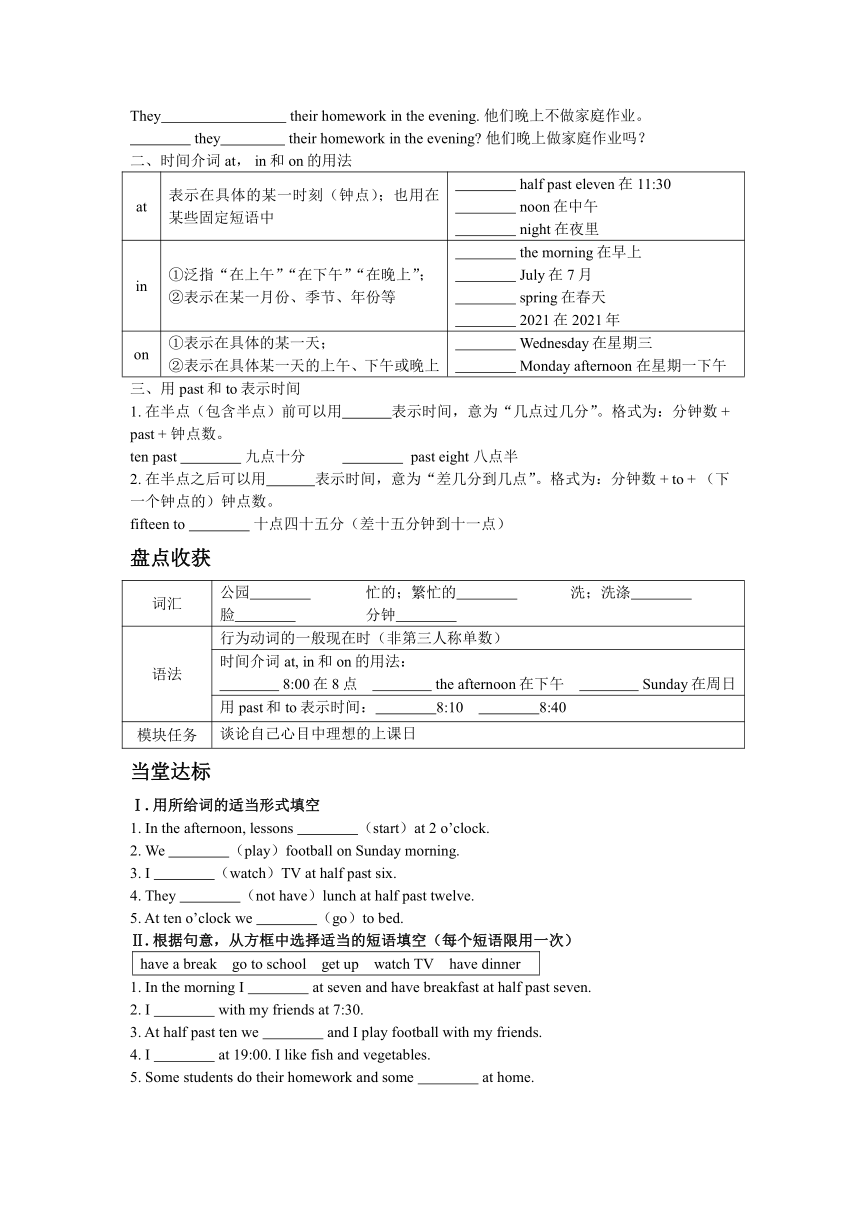外研版英语七年级上册 Module 5 My school day.Unit 3 Language in use.学案(word版,含解析)
文档属性
| 名称 | 外研版英语七年级上册 Module 5 My school day.Unit 3 Language in use.学案(word版,含解析) |

|
|
| 格式 | docx | ||
| 文件大小 | 21.7KB | ||
| 资源类型 | 教案 | ||
| 版本资源 | 外研版 | ||
| 科目 | 英语 | ||
| 更新时间 | 2022-12-01 00:00:00 | ||
图片预览


文档简介
Module 5 My school day
Unit 3 Language in use
学习目标
1. 学习并掌握本单元新单词:park, busy, wash, face, minute;复习巩固本模块单词、短语和句型。
2. 总结模块语法:行为动词的一般现在时:时间介词at, in和on的用法;用past和to表示时间。
3.能够谈论自己心目中理想的上课日。
自主学习
学习任务:读音标,拼写单词
/d i ɡr fi/ / h st ri/ / lesn/ / d f klt/
/ s bd kt/ / ntr st / /bre k/ / i vn /
/w t / /sli p/ /pɑ k/ / b zi/
/w / /fe s/ / m n t/
合作探究
一、行为动词的一般现在时
1. 用法
(1)表示经常性或习惯性的动作,常与表示频度的时间状语连用,如:always, usually, often, sometimes, every morning/afternoon/evening, every day/week/year等。
I go to school at 7:00 every morning.
我每天早上7点去上学。
(2)表示现在的状态。
I like English very much. 我非常喜欢英语。
2. 行为动词的一般现在时的句式结构
行为动词的一般现在时分为主语为第三人称单数和非第三人称单数两种。本模块我们主要学习主语为非第三人称单数的一般现在时形式。
(1)肯定句结构:主语 + 动词 + 其他.
They (live)far away from school.
他们住得离学校很远。
(2)否定句结构:主语 + + 动词原形 + 其他.
They (not live)far away from school.
他们住得离学校不远。
(3)一般疑问句结构: + 主语 + 动词原形 + 其他?
— they (live)far away from school
他们住得离学校远吗?
—Yes, they . /No, they .
是的,他们住得远。/不,他们住得不远。
【注意】do除了作 动词之外,还可用作行为动词,意为“干;做”。
They their homework in the evening. 他们晚上做家庭作业。
They their homework in the evening. 他们晚上不做家庭作业。
they their homework in the evening 他们晚上做家庭作业吗?
二、时间介词at, in和on的用法
at 表示在具体的某一时刻(钟点);也用在某些固定短语中 half past eleven在11:30 noon在中午 night在夜里
in ①泛指“在上午”“在下午”“在晚上”; ②表示在某一月份、季节、年份等 the morning在早上 July在7月 spring在春天 2021在2021年
on ①表示在具体的某一天; ②表示在具体某一天的上午、下午或晚上 Wednesday在星期三 Monday afternoon 在星期一下午
三、用past和to表示时间
1. 在半点(包含半点)前可以用 表示时间,意为“几点过几分”。格式为:分钟数 + past + 钟点数。
ten past 九点十分 past eight 八点半
2. 在半点之后可以用 表示时间,意为“差几分到几点”。格式为:分钟数 + to + (下一个钟点的)钟点数。
fifteen to 十点四十五分(差十五分钟到十一点)
盘点收获
词汇 公园 忙的;繁忙的 洗;洗涤 脸 分钟
语法 行为动词的一般现在时(非第三人称单数)
时间介词at, in和on的用法: 8:00在8点 the afternoon在下午 Sunday在周日
用past和to表示时间: 8:10 8:40
模块任务 谈论自己心目中理想的上课日
当堂达标
Ⅰ. 用所给词的适当形式填空
1. In the afternoon, lessons (start)at 2 o’clock.
2. We (play)football on Sunday morning.
3. I (watch)TV at half past six.
4. They (not have)lunch at half past twelve.
5. At ten o’clock we (go)to bed.
Ⅱ. 根据句意,从方框中选择适当的短语填空(每个短语限用一次)
have a break go to school get up watch TV have dinner
1. In the morning I at seven and have breakfast at half past seven.
2. I with my friends at 7:30.
3. At half past ten we and I play football with my friends.
4. I at 19:00. I like fish and vegetables.
5. Some students do their homework and some at home.
Ⅲ. 根据汉语意思完成句子
1. 我和爸爸妈妈去公园。
I the park with my parents.
2. 我不喜欢这件外套。
I this coat.
3. 我们下午4点钟回家。
We 4 o’clock the afternoon.
4. 星期三下午玲玲和托尼不上地理课。
Lingling and Tony geography Wednesday afternoon.
5. 你们喜欢你们的学校吗?
you your school
Ⅳ. 完形填空
Hello,everyone! My name’s Liu Chang. This year I go to study in 1 . Do you want to
know about life in America Now let me tell you.
I have 2 from Monday to Friday. School 3 at nine o’clock in the morning. And I
can 4 at about three o’clock in the 5 . I have maths,English,science,art,PE at
school. After class I 6 much homework,so I can 7 lots of other things. I join a rock
band(乐队) because I like 8 very much. And I join the 9 club. Science is difficult,
10 it is interesting.
1. A. Beijing B. London C. New York D. Shanghai
2. A. homework B. time C. classes D. friends
3. A. start B. starts C. to start D. starting
4. A. go to school B. go home C. go here D. go there
5. A. morning B. afternoon C. evening D. night
6. A. have B. not have C. doesn’t have D. don’t have
7. A. do B. play C. have D. go
8. A. sports B. football C. music D. history
9. A. English B. maths C. art D. science
10. A. and B. but C. so D. or
学后反思
___________________________________________________________________________________________________________________________________________________________________________________________________________________________________________________________________________________________________________________________________________________________________________________________________________
当堂达标答案与解析:
Ⅰ. 1. start 该句主语为lessons,谓语动词应用原形。
2. play 主语为we,谓语动词应用原形。
3. watch 该句主语为I,谓语动词用原形。
4. don’t have 主语为they,have为行为动词,表示否定时应借助助动词do的否定形式
don’t,后接动词原形,故填don’t have。
5. go 该句主语为we,谓语动词用原形。
Ⅱ. 1. get up 2. go to school 3. have a break 4. have dinner 5. watch TV
Ⅲ. 1. go to 2. don’t like 3. go home at, in 4. don’t have, on 5. Do, like
Ⅳ.语篇解读:这是一篇介绍刘畅在美国的学校学习的短文。刘畅周一至周五去上学,上午九点钟开始上课,下午大约三点钟放学回家;在学校里他学习数学、英语、科学、美术和体育课程,放学后他没有许多家庭作业,所以他加入了乐队和科学俱乐部。
1. C 根据后句“Do you want to know about life in America ”可知,刘畅去上学的国家是美国,而选项中只有C项(纽约)是美国的城市。
2. C 根据句中from Monday to Friday可知,该句句意为“周一到周五我上课”,表示“上课”用have classes。
3. B 句中主语School是单数形式,作谓语的动词要用第三人称单数形式,故选B。
4. B 根据句中at about three o’clock可知,这个时间是下午放学回家的时间,而非上学的时间,故选B。
5. B 根据语境及常识可知此处指一天中的下午。
6. D 根据后面的文意“我能做许多其他的事情”可推知,放学后没有许多家庭作业要做,句中主语是I,行为动词作谓语变为否定句时要借助助动词do的否定形式don’t,故选D。
7. A 表示“做许多其他的事情”时句子的谓语动词要用do。
8. C 根据前半句I join a rock band可推知“因为我非常喜欢音乐”,故选C。
9. D 根据后句有关science的叙述可知,“我”加入了科学俱乐部,故选D。
10. B 前一分句意为“科学很难”,后一分句意为“它很有趣”,二者在语意上构成转折关系,故此空需填连词but。
Unit 3 Language in use
学习目标
1. 学习并掌握本单元新单词:park, busy, wash, face, minute;复习巩固本模块单词、短语和句型。
2. 总结模块语法:行为动词的一般现在时:时间介词at, in和on的用法;用past和to表示时间。
3.能够谈论自己心目中理想的上课日。
自主学习
学习任务:读音标,拼写单词
/d i ɡr fi/ / h st ri/ / lesn/ / d f klt/
/ s bd kt/ / ntr st / /bre k/ / i vn /
/w t / /sli p/ /pɑ k/ / b zi/
/w / /fe s/ / m n t/
合作探究
一、行为动词的一般现在时
1. 用法
(1)表示经常性或习惯性的动作,常与表示频度的时间状语连用,如:always, usually, often, sometimes, every morning/afternoon/evening, every day/week/year等。
I go to school at 7:00 every morning.
我每天早上7点去上学。
(2)表示现在的状态。
I like English very much. 我非常喜欢英语。
2. 行为动词的一般现在时的句式结构
行为动词的一般现在时分为主语为第三人称单数和非第三人称单数两种。本模块我们主要学习主语为非第三人称单数的一般现在时形式。
(1)肯定句结构:主语 + 动词 + 其他.
They (live)far away from school.
他们住得离学校很远。
(2)否定句结构:主语 + + 动词原形 + 其他.
They (not live)far away from school.
他们住得离学校不远。
(3)一般疑问句结构: + 主语 + 动词原形 + 其他?
— they (live)far away from school
他们住得离学校远吗?
—Yes, they . /No, they .
是的,他们住得远。/不,他们住得不远。
【注意】do除了作 动词之外,还可用作行为动词,意为“干;做”。
They their homework in the evening. 他们晚上做家庭作业。
They their homework in the evening. 他们晚上不做家庭作业。
they their homework in the evening 他们晚上做家庭作业吗?
二、时间介词at, in和on的用法
at 表示在具体的某一时刻(钟点);也用在某些固定短语中 half past eleven在11:30 noon在中午 night在夜里
in ①泛指“在上午”“在下午”“在晚上”; ②表示在某一月份、季节、年份等 the morning在早上 July在7月 spring在春天 2021在2021年
on ①表示在具体的某一天; ②表示在具体某一天的上午、下午或晚上 Wednesday在星期三 Monday afternoon 在星期一下午
三、用past和to表示时间
1. 在半点(包含半点)前可以用 表示时间,意为“几点过几分”。格式为:分钟数 + past + 钟点数。
ten past 九点十分 past eight 八点半
2. 在半点之后可以用 表示时间,意为“差几分到几点”。格式为:分钟数 + to + (下一个钟点的)钟点数。
fifteen to 十点四十五分(差十五分钟到十一点)
盘点收获
词汇 公园 忙的;繁忙的 洗;洗涤 脸 分钟
语法 行为动词的一般现在时(非第三人称单数)
时间介词at, in和on的用法: 8:00在8点 the afternoon在下午 Sunday在周日
用past和to表示时间: 8:10 8:40
模块任务 谈论自己心目中理想的上课日
当堂达标
Ⅰ. 用所给词的适当形式填空
1. In the afternoon, lessons (start)at 2 o’clock.
2. We (play)football on Sunday morning.
3. I (watch)TV at half past six.
4. They (not have)lunch at half past twelve.
5. At ten o’clock we (go)to bed.
Ⅱ. 根据句意,从方框中选择适当的短语填空(每个短语限用一次)
have a break go to school get up watch TV have dinner
1. In the morning I at seven and have breakfast at half past seven.
2. I with my friends at 7:30.
3. At half past ten we and I play football with my friends.
4. I at 19:00. I like fish and vegetables.
5. Some students do their homework and some at home.
Ⅲ. 根据汉语意思完成句子
1. 我和爸爸妈妈去公园。
I the park with my parents.
2. 我不喜欢这件外套。
I this coat.
3. 我们下午4点钟回家。
We 4 o’clock the afternoon.
4. 星期三下午玲玲和托尼不上地理课。
Lingling and Tony geography Wednesday afternoon.
5. 你们喜欢你们的学校吗?
you your school
Ⅳ. 完形填空
Hello,everyone! My name’s Liu Chang. This year I go to study in 1 . Do you want to
know about life in America Now let me tell you.
I have 2 from Monday to Friday. School 3 at nine o’clock in the morning. And I
can 4 at about three o’clock in the 5 . I have maths,English,science,art,PE at
school. After class I 6 much homework,so I can 7 lots of other things. I join a rock
band(乐队) because I like 8 very much. And I join the 9 club. Science is difficult,
10 it is interesting.
1. A. Beijing B. London C. New York D. Shanghai
2. A. homework B. time C. classes D. friends
3. A. start B. starts C. to start D. starting
4. A. go to school B. go home C. go here D. go there
5. A. morning B. afternoon C. evening D. night
6. A. have B. not have C. doesn’t have D. don’t have
7. A. do B. play C. have D. go
8. A. sports B. football C. music D. history
9. A. English B. maths C. art D. science
10. A. and B. but C. so D. or
学后反思
___________________________________________________________________________________________________________________________________________________________________________________________________________________________________________________________________________________________________________________________________________________________________________________________________________
当堂达标答案与解析:
Ⅰ. 1. start 该句主语为lessons,谓语动词应用原形。
2. play 主语为we,谓语动词应用原形。
3. watch 该句主语为I,谓语动词用原形。
4. don’t have 主语为they,have为行为动词,表示否定时应借助助动词do的否定形式
don’t,后接动词原形,故填don’t have。
5. go 该句主语为we,谓语动词用原形。
Ⅱ. 1. get up 2. go to school 3. have a break 4. have dinner 5. watch TV
Ⅲ. 1. go to 2. don’t like 3. go home at, in 4. don’t have, on 5. Do, like
Ⅳ.语篇解读:这是一篇介绍刘畅在美国的学校学习的短文。刘畅周一至周五去上学,上午九点钟开始上课,下午大约三点钟放学回家;在学校里他学习数学、英语、科学、美术和体育课程,放学后他没有许多家庭作业,所以他加入了乐队和科学俱乐部。
1. C 根据后句“Do you want to know about life in America ”可知,刘畅去上学的国家是美国,而选项中只有C项(纽约)是美国的城市。
2. C 根据句中from Monday to Friday可知,该句句意为“周一到周五我上课”,表示“上课”用have classes。
3. B 句中主语School是单数形式,作谓语的动词要用第三人称单数形式,故选B。
4. B 根据句中at about three o’clock可知,这个时间是下午放学回家的时间,而非上学的时间,故选B。
5. B 根据语境及常识可知此处指一天中的下午。
6. D 根据后面的文意“我能做许多其他的事情”可推知,放学后没有许多家庭作业要做,句中主语是I,行为动词作谓语变为否定句时要借助助动词do的否定形式don’t,故选D。
7. A 表示“做许多其他的事情”时句子的谓语动词要用do。
8. C 根据前半句I join a rock band可推知“因为我非常喜欢音乐”,故选C。
9. D 根据后句有关science的叙述可知,“我”加入了科学俱乐部,故选D。
10. B 前一分句意为“科学很难”,后一分句意为“它很有趣”,二者在语意上构成转折关系,故此空需填连词but。
同课章节目录
- Starte
- Module 1 My teacher and my friends
- Module 2 My English lesson
- Module 3 My English book
- Module 4 My everyday life
- Module 1 My classmates
- Unit 1 Nice to meet you.
- Unit 2 I'm Wang Lingling and I'm thirteen years ol
- Unit 3 Language in use.
- Module 2 My family
- Unit 1 Is this your mum?
- Unit 2 These are my parents.
- Unit 3 Language in use.
- Module 3 My school
- Unit 1 There are thirty students in my class.
- Unit 2 The library is on the left of the playgroun
- Unit 3 Language in use.
- Module 4 Healthy food
- Unit 1 We've got lots of apples.
- Unit 2 Is your food and drink healthy?
- Unit 3 Language in use.
- Module 5 My school day
- Unit 1 I love history.
- Unit 2 We start work at nine o'clock.
- Unit 3 Language in use.
- Revision module A
- Module 6 A trip to the zoo
- Unit 1 Does it eat meat?
- Unit 2 The tiger lives in Asia.
- Unit 3 Language in use.
- Module 7 Computers
- Unit 1 How do I write my homework on the computer?
- Unit 2 When do you use a computer?
- Unit 3 Language in use.
- Module 8 Choosing presents
- Unit 1 I always like birthday parties.
- Unit 2 She often goes to concerts.
- Unit 3 Language in use.
- Module 9 People and places
- Unit 1 We're enjoying the school trip a lot.
- Unit 2 They're waiting for buses or trains.
- Unit 3 Language in use.
- Module 10 Spring Festival
- Unit 1 Are you getting ready for Spring Festival?
- Unit 2 My mother's cleaning our houses and sweepin
- Unit 3 Language in use.
- Revision module B
